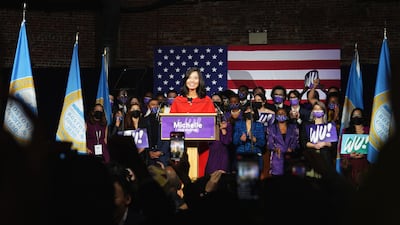In a historic milestone, Bostonians on Tuesday elected a mayor who is both a woman and a person of colour: Michelle Wu, a 36-year-old city councillor who backs rent control, free public transport and a city-level “Green New Deal".
Ms Wu’s city council colleague and fellow Democrat, Annissa Essaibi George, conceded on Tuesday night.
With 100 per cent of precincts reporting, Ms Wu led by about 28 percentage points, The Associated Press reported.
Scheduled to take office on November 16, Ms Wu is the first woman to win the Boston, Massachusetts, mayoralty since it was created in 1822.
She takes over from acting mayor Kim Janey, who assumed the role in March after former mayor Marty Walsh became US Secretary of Labour.
Ms Janey became the first woman of colour in the post, but Ms Wu is the first to be elected to it.
The Harvard-educated Ms Wu, who is Taiwanese-American and grew up in Chicago, is a close ally of Elizabeth Warren.
Her policy proposals represent a local-level shift towards big-picture progressive ideas on the rise in the national Democratic Party, said David Hopkins, associate professor of political science at Boston College.
Ms Wu emphasises the audacity of her policies. She told reporters on the eve of the election: “We are standing on the brink of history, where Boston has the chance to choose between nibbling around the edges of the status quo or taking the big, bold actions that we have needed for a long time.”
When asked about her plans for her first steps as mayor, however, she struck a pragmatic chord, saying she would begin by building a team.
“The new administration will be starting in the midst of the shift to winter,” she added, “preparing for cold weather [ …] and how to take immediate action and ensure that people are not in the streets as winter comes.”
It will also focus on the pandemic response in schools and on closing vaccination gaps, she said.
Also on Ms Wu’s list of first tasks: a national search for a police commissioner and assembling a team to examine how to reform the permitting process for building and funding free public transit — beginning with bus services.
In recent polls asking which issues Boston voters care about, cheaper housing and improving the city’s underperforming public schools were repeatedly placed at the top. Ms Wu argued in a debate that “everything should be on the table” for housing and she has emphasised that, as the mother of young schoolchildren, she will prioritise education issues.

